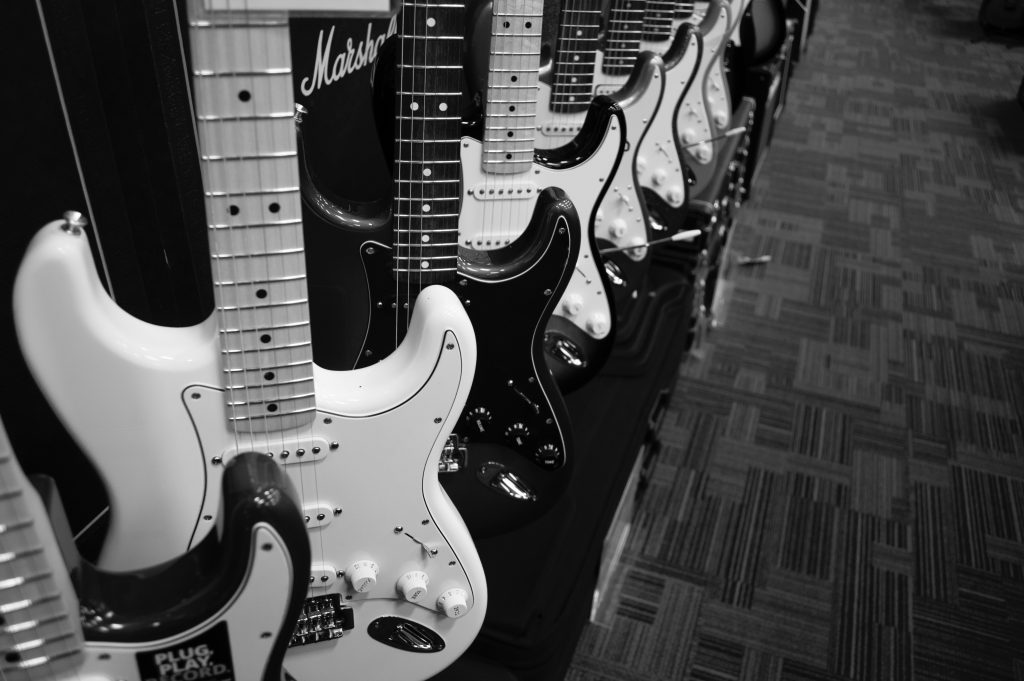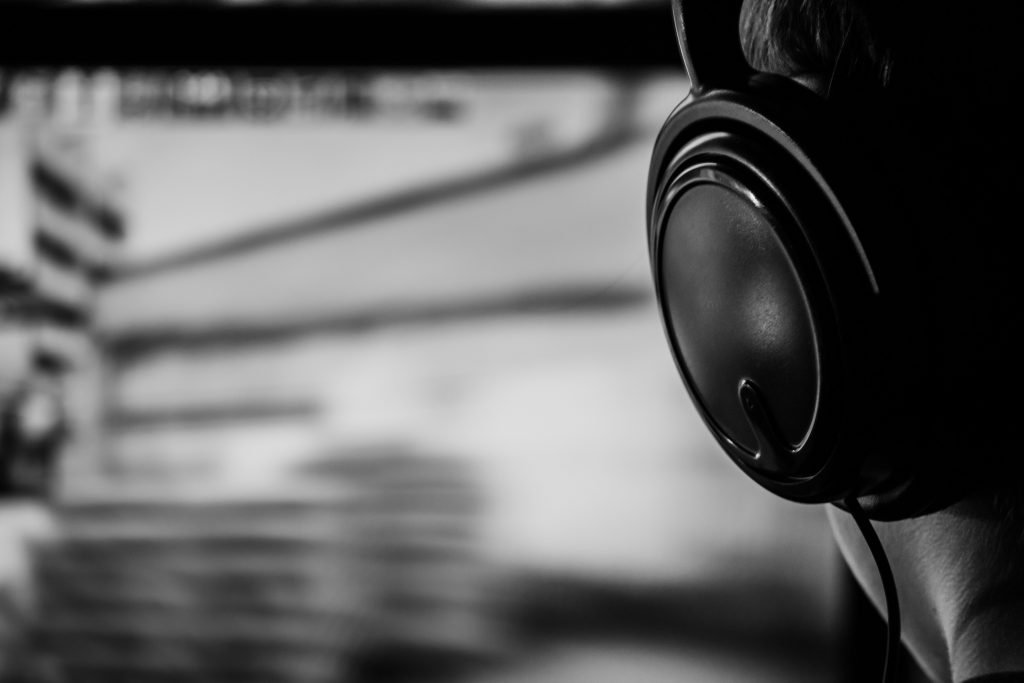I wrote my first song, when I was 15 years old and simply called it “Felix’ Song”.
That was the start of an exciting and lifelong journey. In music, not much has yet brought me more satisfaction than writing a good song.
It’s not all about, if other people like your music – tastes are different.
When I get hooked on a song I wrote, I know it’s good stuff.
What I always liked most about it, was the creative process. We humans are creative creatures and every time we produce something, we fulfill our purpose.
In this article, I want to share some ideas on how to learn to write songs.
1. Inhale Other Music
That’s basically something we do automatically anyways. From the moment we’re born, we’re exposed to music.
Music is everywhere, and we passively consume it daily.
Depending on our environment, the kind and style of the music we listen to may differ widely.
Over the years we more and more make our own decisions, what music we like and what artists we want to have on our smartphone. The transformation of our personality starts.
In order to become a skilled songwriter, you can only benefit from listening to a wide variety of music styles.
The broader your spectrum as a listener, the more interesting your own songs will be.
Keep in mind that your music will be a mix up of everything you’ve heard before, your own experiences and the emotional state you’re in when writing a song.
So, always look out for new interesting music and also give Jazz, Classical music and Deat Metal a try.
2. Learn An Instrument –
When you are a singer without the ability to play any instrument, it’s hard to become an autonomous songwriter.
Sure, you probably will have a melody in your mind once in a while, but never be able to write a whole song without the help of a “real” musician.

Besides, there’s nothing more delighting than just accompanying yourself shredding the guitar or sitting down on the piano. As easy as can be.
You don’t have to strive for being the next Eddie van Halen, but learning some basic chords on the guitar is quickly done.
Just check out some free YouTube videos or subscribe to an online guitar course.
3. The Kiss of The Muse
Having covered the prerequisites to support your songwriting, here comes the magic part of it.
There is one rule.
“Be ready, but don’t force it”
I’ve once read about, how creativity works. First we have to understand, that we don’t write music. Music is written.
We are only a channel for creativity to manifest.
Sounds spooky? Well, but that’s actually what I experience every time I write something beautiful.
Here’s my approach for songwriting:
- I grab my guitar and just fool around, without playing something intentionally
- Soon a melody appears (in my head) and I try to match it with the right chords
- Within a few minutes I can tell if the song idea is going somewhere or not
- If so, I stop and record the session
- While trying some variations of the melody, I sing along, without even thinking about certain lyrics
- I continue until the flow vanish
It’s really magical, because after just 10-15 minutes the song is basically set.
Melody, harmonies, lyrics and song structure come together pretty quickly, without the feeling of doing it.
Astonishingly, the phrases I babble in the first place are mostly the best.
Of course, it doesn’t always work that way. I stopped attempting to schedule songwriting.
Every time it feels like hard work to find a melody or complete a song, I know that it’s just not right and I trash it,
4. Listen Back – Be your Own critic
After I was kissed by the muse in the first place, I work with the core of the song and simply repeat the process.
The difference here is, that I just have to fine tune things, so it doesn’t need that magic moment anymore to finalize the song.
It’s essential to always record every songwriting session. I therefore use just my smartphone with a simple and free, still superb app called Voice Record Pro.
While repeating the song, I try minor melody variations and keep looking for further lyrics.
Still, I let everything happen naturally while playing the song. So I don’t sit down beforehand and think about what note would be better or what line suits best.

After every session I leave it for a while and then listen back.
When listening, I change my perspective and judge as an auditor.
The main criteria are always: What sounds good? What feels good? What connects with me emotionally? It’s always pretty obvious what works, so I simply sort out the best parts.
After 3-4 songwriting sessions my job is done and the whole song is in my pocket.
Sometimes I have to complete the lyrics separately, which I usually build around the hooks.
5. Get Feedback – But Don’t Take it Personal
If your intentions are beyond writing music for yourself, you should always seek constructive feedback from the outside world. Until now, you only have a very subjective opinion about your song – your own.

I’ve once read an article about how John Mayer approaches a new album production. He invited 5 members of his largest fan club and played back 5 demo songs to them. Then they should give their opinions, what song(s) should be on the album and what they liked about them.
Even if you don’t plan to release your music, it can be very fruitful to know, what other people think about it.
Choose wisely, because not everyone is suitable for this task.
Especially avoid close friends, partners and family members. The will most likely not be fully honest to you, because they don’t want to hurt you. But growing, sometimes also means pain.
Ideally look for genuine and constructive feedback. Band mates would be perfect here. They have an interest in getting new song material, still only wanting good stuff to feature the band.
Moreover, obtain opinions from a variety of people. You are interested in technical feedback (“maybe you should try a D instead of a C there”) and emotional feedback (“The chorus gave me goosebumps”).
As presenting ones own music it to others is a very sensitive topic, I understand that you’d rather want praise before critic.
Nevertheless, if you want to grow as an artist as well as a person, you have to cope with negative feedback and get rid of taking it too personal.
Conclusion
Songwriting is one of the most exciting experiences a musician can have. Especially as a singer, you will bring your art to a new level of expression.
Playing an instrument comes in handy to further develop a raw song idea. You should also practice getting into the state of reception and flow, rather than pushing hard for a melody.
If you want a good song to call your own, be critical to yourself and obtain other people opinions about your music.
Any questions or something to add to this topic? Feel free to post a comment.

Wow! You sound like you are a very talented individual! I agree that we are all creative and we need to express that individuality. My husband and my daughter are very musically inclined but I express my creativity in websites. We all need a creative outlet to be happy – at least I think so!
Thanks Heather. I’m really believe, we are all creative individuals and are most gratified when bringing something into being. Our main purpose here on earth is to create, wether it’s in art, business, construction or anything else.
These are very good ideas on how to learn to write songs.
I specially like #1. It’s like anything in life, the more diversification of knowledge the better you’ll become at facing roughly any task. That’s why experimenting is so important!
So, even if it may sound odd for a heavy metal fan to listen to classical music, I believe it can be highly beneficial for him/her. Just like you said.
Congrats! Great article.
Thank you Eliane. The thing is, that we are a product of our experiences – in any ways.
I loved this article. My dad has played the guitar and sung since I can remember, he is so good. I always wished I had the talent…I always say I had the heart just not the talent 🙂 This is a great approach for someone who is wanting to start on their music journey.
~Janelle
Thanks for your comment Janelle. Since I’m also a father, it touches me to read about your dads music passion.
This was really well put. I used to write poetry and I remember how hard it was to write a poem if I just wasn’t feeling it. You speak with true passion.
So you experienced the same thing. Without inspiration, it won’t be true art.
Hey Felix,
This is a great one! I’m not a music person but I can somewhat relate to the things you talked about. I love your tips like “be ready but don’t force it” and “be your own critic”. These are very simple yet powerful advice. I’m sure people can benefit from you post. Keep up the good work 🙂
Thanks Jerry!